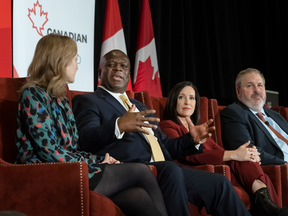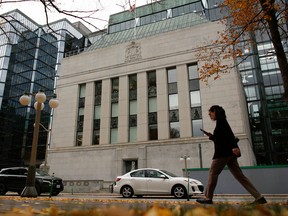Kevin Carmichael: Fiscal policy can do more. Freeland teased this week she’s willing to do her share. Proof will come later
Article content
Finance Minister Chrystia Freeland might be gearing up for an inflation fight, but we won’t know for sure until sometime next year.
Advertisement
This advertisement has not loaded yet, but your article continues below.
Article content
Freeland avoided significant new spending in tabling a fiscal update on Dec. 14, a mild surprise for a government with a reputation for profligacy, and perhaps a sign that even Prime Minister Justin Trudeau’s cabinet has become spooked by some of the most intense pricing pressures in three decades.
“As we look ahead, we are mindful of elevated inflation,” Freeland said in the forward of the update. “We know inflation is a global phenomenon driven by the unprecedented challenge of re-opening the world’s economy. Turning on the global economy is a good deal more complicated than turning it off. We, like other countries, are experiencing the consequences of a time unlike any other.”
The Finance Department sees a narrower budget deficit in the fiscal year ending March 30, 2022, due to increased revenue from stronger economic growth and surging oil prices. The revised outlook has the debt peaking at 48 per cent of gross domestic product (GDP) this year, and then declining to 44 per cent by 2026.
Advertisement
This advertisement has not loaded yet, but your article continues below.
Article content
A debt load of that size is elevated compared with Canada’s recent history, but nothing a $2-trillion economy can’t handle, provided the trajectory stays on a downward track and the economy regains its footing after last year’s epic recession.
The Omicron variant is Ottawa’s most pressing concern, and Freeland set aside some money in anticipation of another wave of COVID-19 infections. But the inflation scare gripping Canada and other rich economies is also in the picture. A steady-as-she-goes financial plan will help, since an economy some economists think has achieved full employment is well past the point of needing fiscal stimulus.
“They didn’t do any extra spending,” Ed Devlin, founder of Devlin Capital, said on BNN Bloomberg. “Good on them.”
Advertisement
This advertisement has not loaded yet, but your article continues below.
Article content
Yet that was quite literally the least the federal government could have done under the circumstances.
One of the main drivers of inflation is the soaring cost of housing, which Freeland acknowledged and promised “action” in her next budget.
Another way to fight inflation would be to increase the economy’s capacity to generate non-inflationary growth. In October, the Bank of Canada dropped its estimate of “potential” growth to 1.6 per cent, a meagre outlook that reflects chronically weak productivity and lacklustre business investment. An effort to redirect federal spending to programs that would accelerate investment and boost competitiveness could offset supply shortages.
Freeland once again said “measures to promote jobs and growth” will “figure prominently” in the next budget, but they were absent in the update, meaning investors and executives are facing another period of uncertainty over the Trudeau government’s commitment to tackling a long list of structural economic issues.
Advertisement
This advertisement has not loaded yet, but your article continues below.
Article content
“We need to walk and chew gum at the same time, which means managing the pandemic today and addressing the economic challenges that keep back our growth potential the day after,” said Mark Agnew, head of policy at the Canadian Chamber of Commerce. “We shouldn’t wait until we emerge from the pandemic since what ails the economy is not an overnight fix.”
Freeland put pressure on herself earlier this week to rise to the occasion by tacitly conceding governments have been putting too much pressure on their central banks to carry the burden of economic recovery.
-

Canada still plans digital services tax; Google disappointed
-

From business subsidies to housing tax exemptions: Four takeaways from the fiscal update
-

COVID-19 was ‘expensive,’ but Freeland says economy is improving in fiscal update
Advertisement
This advertisement has not loaded yet, but your article continues below.
Article content
The result is uncomfortably high pricing pressures that officials worry could turn into an inflationary spiral. Year-over-year increases in the consumer price index (CPI), a broad measure of inflation the Bank of Canada uses to guide interest-rate policy, is approaching five per cent, the highest since the early 1990s.
Macklem is doing his part to bring the temperature down. He has stopped talking about running the economy hot enough to push the jobless rate back to its pre-pandemic level of about five per cent, and is now guiding the public to be ready for an interest-rate increase by the second quarter of 2022. The Bank of Canada also abruptly ended its bond-buying program in October, a signal that policy-makers thought the economy was strong enough to survive without emergency stimulus.
Some economists would like the Bank of Canada to move even faster. But Macklem remains wary of prematurely choking off the recovery. Employment is back at pre-pandemic levels, but gross domestic product remains lower than it was in February 2020. Higher interest rates might take some heat out of the housing market, an important source of inflation.
But an unexpected pivot to higher interest rates could hurt households relying on the value of their homes to float the debt they accumulated by chasing runaway real-estate prices. It’s better, therefore, to move to a higher interest-rate setting as gradually as possible. Furthermore, monetary policy can do little to speed up the unloading of containers in clogged ports, or increase the supply of computer chips and other vital inputs.
Fiscal policy can do more. Freeland teased this week she’s willing to do her share. Proof will come later.
• Email: kcarmichael@postmedia.com | Twitter: carmichaelkevin
Advertisement
This advertisement has not loaded yet, but your article continues below.
Ottawa knows it has an economic fight on its hands, but action will have to wait
2021-12-14 23:10:41






